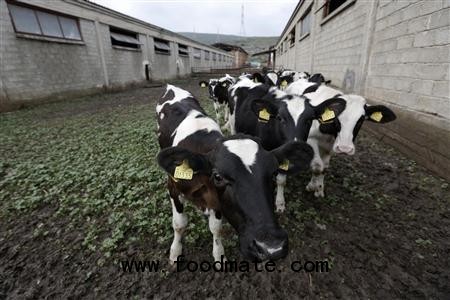
Tall elm trees screen the 4 hectares (10 acres) of land that Aravanis farms outside the small town of Orchomenos in central Greece, not far from the ancient city of Thebes. The silence is broken only by the sound of grazing cattle and a passing tractor.
Each day 200 or so cows produce 5.5 metric tonnes of milk that he has been selling to Delta, a division of food conglomerate Vivartia, since 1990. Delta, which collects the milk every two days, pays him 45 euro cents a liter.
That is in line with the average farm-gate price in Greece of 44.79 cents, according to Eurostat, the EU's statistics office. Only in Finland, Malta and Cyprus is the price higher.
Aravanis said his running costs made it impossible to produce more cheaply.
His farm is too small for him to grow fodder for his total herd of 440 animals, so he has to buy in clover, maize, oats, hay and soya, which is imported from the United States.
"If the price fell to 40 cents none of us would be able to survive. We are barely getting by at these prices," he said.
Aravanis reserves his harshest criticism for government bureaucrats, who he says make it hard for farmers to obtain land permits to expand and reap economies of scale. "It's not as if cows are going to be grazing in their living room," he said.
George Kefalas, who produces milk on a family farm near the northern city of Thessaloniki, said it can take two or three years to get an operating license.
"In other countries, even in the developing world, these are issues that were resolved decades ago," Kefalas, the head of Greece's Cattle Breeders' Association, said. He says he supplies milk to the dairy firm Olympus at 46 cents a liter.
WHY SO HIGH?
At the other end of the dairy chain stand Greek shoppers, who wonder why they have to pay around 1.50 euros for a liter of fresh milk.
Agnes Papadopoulou, 46, a mother of two young children who lost her job as an accountant in January, stopped buying fresh milk months ago because she could no longer afford it.
"It's too expensive. It's impossible to get by when you need two liters a day, plus bread, plus food, never mind all the bills and taxes we have to pay. Fresh milk is a luxury," Papadopoulou said, pushing a trolley stacked with pasta, lentils and tinned food in an Athens supermarket.
Attempting direct comparisons with prices elsewhere in Europe is treacherous because so many variables are in play, such as transport costs, rents and consumer preferences.
But Eurostat says the price in Greece of dairy produce -milk, cheese and eggs - was 31.5 percent above the EU average in 2011, the highest in Europe.
Greek dairy firms say they charge a fair price and their sector is one of the least profitable due to high costs.
But many Greeks assume that milk prices are rigged, a suspicion reinforced by a fine of 75 million euros that the Competition Commission slapped on several firms in 2007 for fixing prices between themselves and with supermarkets.
The companies are still challenging the ruling in court.
"Of course milk needs to be cheaper. The government needs to do something because the big companies are taking advantage of us," said Loukia Antonopoulou, 41, a saleswoman in a clothes shop in Athens.
NOT CHEAP, BUT FAIR
Athanasios Skordas, the deputy minister for economic development and competitiveness, said the very fact that the price of a liter of milk ranges from 0.85 to 2.10 euros shows there is no indication of price fixing.
"Competition works. There is a large number of active firms and the price range is very wide," he told Reuters. "I'm not saying milk is cheap, but I think the price is very fair."
Skordas said milk was expensive because of farmers' high production costs, expensive packaging and the cost of transporting milk to remote islands and villages.
Moreover, fresh milk is sold in Greece with a shelf life of just five days, which means more trips to collect it from farms.
Dairy farmers oppose a long-standing proposal to extend the shelf life of milk to 10 days, as is common elsewhere in Europe.
This could be done relatively simply in the pasteurisation process, but Skordas said cattle breeders feared - unnecessarily, in his opinion - that this would open the door to increased competition from imported milk.
Back on his muddy farm at Orchomenos, Aravanis said the quality of Greek milk was unbeatable. But he added: "It could be sold a little cheaper. I wish prices could be held down so the consumer with a family could buy even one more liter of milk. That would be very important for us."





